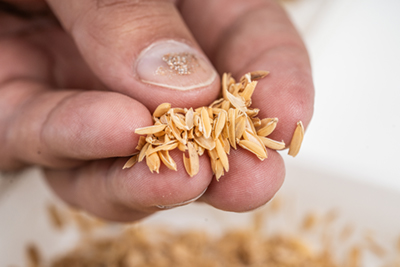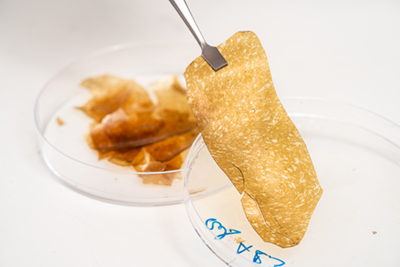New life for discarded food

Will the next generation’s food be made from today’s waste? A team of researchers at KTH is looking into new ways of dealing with unused waste products in the agriculture and food sectors.
Apple residues, mushroom offcuts, corn and grain husks. These are just some of the things that Francisco Vilaplana’s team hope to be able to refine into new foods. The aim is to instigate and encourage a circular flow in our food systems, and thereby help to reduce food waste and waste in general.
At present, almost 40 percent of all produced food goes to waste every year. This accounts for something like 10 percent of global greenhouse gas emissions – figures that must be brought down as soon as possible, according to Vilaplana, a researcher in the field of biotechnology.
“We need to learn to use everything, to reevaluate what we currently call waste, and really take advantage of the available resources,” he says.

During the summer, Vilaplana and his team have been experimenting at a research institution in Hamburg, looking at how wheat bran, the hard outer layer of the wheat kernel, can be developed into a natural part of our food. Using a particle accelerator, the team has been able to analyse how bran and water interact at the nano level, the aim being to gain a better idea of wheat bran’s potential as a dietary supplement.
Healthy ingredient
It is hoped that producing a jelly from fibres and proteins will make it easier for humans to digest – at present wheat bran is mainly used for animal feed. The idea is that the jelly could be a healthy ingredient in foods such as sauces, yoghurt, bread and baked goods.
“The concept already works, we have results showing that wheat bran can be added to different products. The focus now is on quality improvements, and the next stages are commercialisation and product development.”
Vilaplana has various ideas about how other ‘side streams’ in food production could be used in future food production. The challenge lies in establishing cooperation with the food industry and thereby gaining access to the relevant flows, with the aim of researching them. Ultimately, it is also about gaining acceptance for new foods that can compete with traditional processes and products.
The research into wheat bran is taking place in association with Lantmännen, the Swedish agricultural cooperative, amongst others. Vilaplana says that this clearly shows how partnership is crucial in bringing about more sustainable food production.

“We need to bring about a systemic shift in the food industry, one that involves all parties: producers, consumers, logistics and the public sector. The system is complex, and it’s important to agree on priorities to ensure that as many parties as possible are pulling in the same direction.”
New research centre
Circular food processes is also one of the main focus areas of KTH Food – a new research centre at KTH headed up by Francisco Vilaplana. The centre brings together KTH’s expertise and research in the food sector.
Since food has such a huge impact on the climate and the food sector is such a large part of Sweden’s overall industry, it is an important area for future research.
“We hope to act as a catalyst for research at KTH in different parts of the system. There is quite a low level of Innovation in the food sector in Sweden, so there really is great potential here for new ideas and exciting research that’s of real importance to society,” says Vilaplana.
Text: Christer Gummeson
